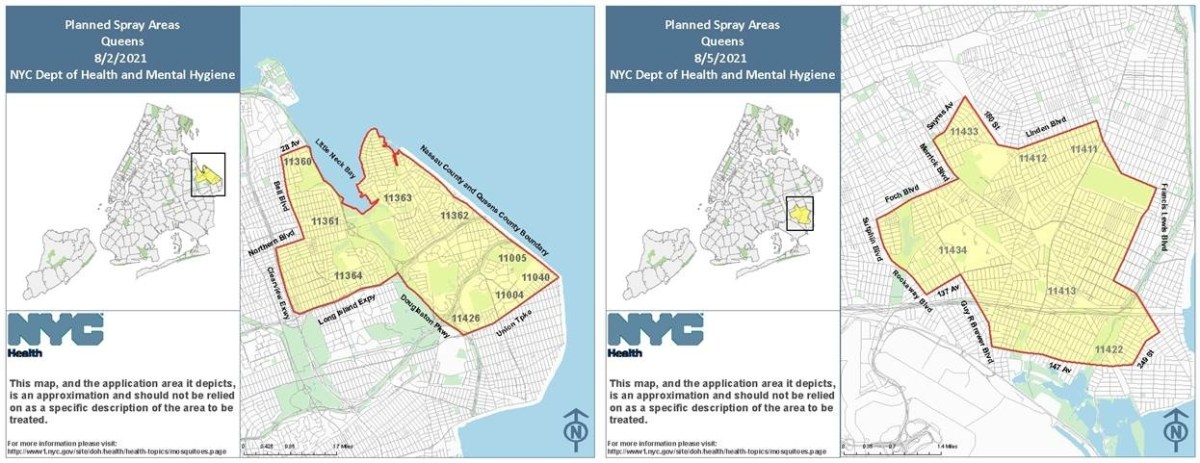Next week, the city’s Health Department will be spraying pesticide in parts of northeast and southeast Queens to reduce mosquito activity in those areas.
According to the city, trucks using very low concentrations of Anvil, Duet or DeltaGard will be active in these parts of the borough in the evenings of Monday, Aug. 2, and Thursday, Aug. 5, between 8:30 p.m. and 6 a.m. the following morning. In case of bad weather or malfunctioning equipment, mosquito spraying will be rescheduled until Tuesday, Aug. 3, and Monday Aug. 9, respectively.
During the summer months, the Health Department monitors mosquito populations in the city and applies pesticides as needed using either adulticide to kill adult mosquitos or aerial larvicide to kill young mosquitos. The DOH said that reducing the number of mosquitoes has been shown to lessen the risk of mosquito-borne diseases like West Nile Virus, which can affect humans, birds, horses and other mammals.
On Aug. 2, pesticide application will affect parts of Bayside, Douglaston Manor, Douglaston, Glen Oaks and Little Neck, including parts of 11004, 11005, 11040, 11360, 11361, 11362, 11364 and 11426.
The specific area receiving the treatment is bordered by Douglaston Parkway, Long Island Expressway, Clearview Expressway, Northern Boulevard and Bell Boulevard to the west; 28th Avenue and Little Neck Bay to the north; Nassau County and Queens County Boundary to the east; and Union Turnpike to the south.
On Aug. 5, spraying will be applied to parts of Brookville, Cambria Heights, Laurelton, Rosedale, St. Albans, South Jamaica and Springfield Gardens, which includes parts of 11411, 11412, 11413, 11422, 11433 and 11434.
The areas are bordered by Guy R Brewer Boulevard, 137th Avenue, Rockaway Boulevard and Sutphin Boulevard to the west; Foch Boulevard, Merrick Boulevard, Sayres Avenue, 180th Street and Linden Boulevard to the north; Francis Lewis Boulevard to the east; and 249th Street and 147th Avenue to the south.
According to DOH, the dangers linked to pesticides used for mosquito control are low to people and pets, but some individuals who are sensitive to spray ingredients or who deal with respiratory conditions may be affected with short-term eye or throat irritation or a rash.
The city advises that people should stay indoors to remain as safe as possible. Air conditioners can remain on, though some may chose to close air conditioners vents or choose the recirculate function.
After spraying, individuals should wash any skin, clothing, fruits and vegetables exposed to pesticides with soap and water.
In order to prevent mosquitos, residents are advised to get rid of standing water sources and dispose of containers that can collect water, as standing water is a violation of the city’s health code.
Other tips to preventing mosquitos include the following:
- Making sure roof gutters are clean and draining properly
- Cleaning and chlorinating swimming pools, outdoor saunas and hot tubs
- Emptying and covering pools that are not in use
- Draining water that collects in pool covers
- Using an approved insect repellent containing DEET, picaridin, oil of lemon eucalyptus (not for children under 3), or products that contain the active ingredient IR3535
- Making sure windows have screens
- Repairing or replacing screens that have tears or holes
Report standing water by calling 311 or visiting nyc.gov/health/wnv. For more information about West Nile virus, call 311 or visit nyc.gov.


































